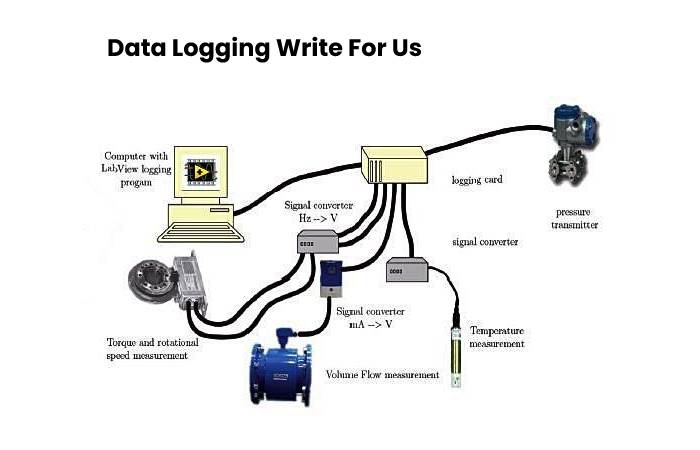Data Logging Write For Us
Gathering data sounds complicated, but it can simplify your supply chain management. Think about it. How much did you lose due to shipping damage? What if you could prevent the crack in the first place? It’s child’s play. And that is exactly what data logging can do when implementing effective monitoring. So what is data logging? Please look at this complete definition of data logging and its components. For Submitting Your Articles, you can email us at contact@supercomputerworld.com
How often have you dealt with transport damage? It becomes a recurring scenario with no compelling circumstances to control to prevent it from happening again. However, the use of data logging can stop this recurring theme. It is a process that uses a data logger to collect and record data over time in different environments.
Due to technological advances, especially IoT, you will even be warned in real-time for any out-of-tolerance condition. However, let’s find out how the recording process works and learn about the different types of sensors.
Definition Of Data Logging
Data logging is collecting and storing data in different systems or environments. It involves tracking a variety of events. In short, it is about collecting data on one or more specific and measurable topics, whatever the method used. Although data logging is usually associated with devices, even looking at a thermometer daily and noting the temperature on a piece of paper with a pen is a rudimentary form of “data logging”. In other words, it’s a systematic collection of information.
Current industry data is mostly collected and stored with. A Data Logging is an electronic device with a microprocessor and memory. Information is usually transferred to a computer manually by picking up the device and plugging it into the computer’s USB port to download the data. However, it can also be transferred to a cloud system. Cloud databases are the most efficient option for storing collected data for most use cases.
Most data loggers are designed to way very specific types of information. For supply chain purposes, the most normally collected information relates to the transportation and shipping environment. You can examination your supply chain processes to identify inefficient environments and activities with this information.
While the paper-and-pencil approach mentioned above is an option for some very simple use cases, it is by no means practical for large-scale surveillance. For this reason, we have developed data loggers to automate the process. The technology is available, so there’s no reason not to use it.
It is important to note that the data collected is largely useless unless used for verification or correction. Knowledge is made to be used.
- Monitor and record data
- Identify problems
- Fix them
- Repeat
How Does Data Collection Work?
Data from the acquisition process is obtained from one or more sensors (inputs). These collected and measured inputs including sound, temperature, ambient light, soil moisture, voltage, etc.
A real data logger consists of 3 components: a microprocessor, a memory, and one or more sensors. This data is securely stored in seconds on a battery-powered electronic device, computer, or cloud, providing instant access to all history. Generally, this electronic device is battery-powered, but some can be connected to an external power source.
The recorders take readings at predetermined times throughout the day, varying from every few hours to real-time. The longer the measuring range, the longer the battery will last.
Data Logging Types
Data loggers make it possible to measure, document, analyze and verify situations in an automated process. The resolve is to use the collected information to confirm or correct transactions, i.e., improve methods and results. Some monitorable parameters are temperature, humidity, light, and shock (due to motion).
Depending on the type of data to be together, a data faller may accept analogue or digital input, or both. For example, an analogue input is required to monitor temperature, pH, and humidity. Your choice depends on the type of media you intend to use, the recorder. There are four main types when choosing a data logger: standalone, wireless, computerized and web-based.
As mentioned earlier, data loggers can be battery-operated or connected to an external power source. Most supply chain sensors are battery-powered units, so they can be placed where you need them. Conditional on the type of data you need to monitor, you can configure devices to take readings at regular intervals, and some loggers are capable of collecting data in real-time. Note that real-time monitoring consumes batteries faster, but some types of measurement may be necessary.
A single sensor device can store only one parameter in one location. In addition, devices can be single-channel input or multi-channel input. Multi-channel devices connect multiple devices simultaneously and are more versatile as they can monitor more conditions simultaneously. When looking for multi-channel data loggers, you should consider how many inputs you need.
The simpler the device, the more likely it is to perform well in its designed task, while its complexity allows for versatility. Remember, the more inputs a machine has, the larger and the more battery it uses.
The Four Basic Types Of Data Logging
However, there are four main types of data loggers: standalone, wireless, computer-based and web-based. Here’s what you need to know about each:
- Standalone Sensors – These are typically small handheld sensors with a USB port that allows data to be transferred to a computer. External sensor models are used to monitor conditions other than the logger location. If the model has a built-in sensor, it can monitor job site data.
- Wireless Sensors – Wireless loggers eliminate the need to retrieve and collect data from different systems manually. They can access the data via mobile devices, Bluetooth or other wireless options and transfer it to a cloud-based platform.
Standalone loggers are usually small and portable and come with a USB port for transferring data to a computer. Models with internal sensors can monitor data in the field, while models with external sensors are used for monitoring outside the recorder.
A wireless logger that can contact data via mobile devices and other wireless selections such as Bluetooth eliminates the need for manual retrieval and compilation of data from different systems. It uses a cloud-based platform. The main advantage is the speed of transmission of data download.
How to Submit Your Articles
For Submitting Your Articles, you can email us at contact@supercomputerworld.com
Why to Write For Super Computer World – Data Logging Write For Us

- Writing for supercomputerworld can give massive exposure to your website for customers looking for Data Logging.
- supercomputerworld presence is on Social media and will share your article for the Data Logging related audience.
- You can reach out to Data Logging enthusiasts.
Search Related Terms to Data Logging Write For Us
Instrument
Programmable
Chart Recorders
Xml
Json
Yaml
Semantic Web
Modbus
Can-Bus
Data Acquisition
Sample Rates
Eeprom
Magnetic Tape
Chart Recorders
Real-Time Clocks
Battery.
Temperature
Relative Humidity
Weather Station
Wildlife Research With Pop-Up Archival Tags
Solar Radiation
Internet Of Things
Sensor
Search Terms for Data Logging Write For Us
Data Logging Write For Us
looking for guest posts
guest posting guidelines
become a guest blogger
guest post
becomes an author
suggest a post
contributor guidelines
guest posts wanted
submit an article
writers wanted
guest posts wanted
submit the post
contributing writer
Guidelines for Article to Writing Data Logging Write For Us
We at supercomputerworld welcomes fresh and unique content related to Data Logging.
Supercomputerworld allow a minimum of 500+ words related to Data Logging.
The editorial team of supercomputerworld does not encourage promotional content related to Data Logging.
For publishing article at supercomputerworld email us at contact@supercomputerworld.com
supercomputerworld allows articles related to technology, Marketing, forex, Trade, crypto, computer and many more.
Related Pages
Endpoint Security Write For Us
programming language write for us


